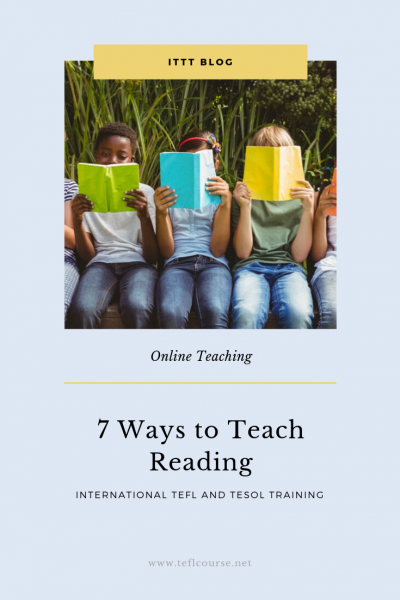7 Ways to Teach Reading

The above is a topic that I want to particularly used to teaching reading to young learners. There are some points given below, they are.
This post was written by our TEFL certification graduate Angeline J. Please note that this blog post might not necessarily represent the beliefs or opinions of ITTT.
1. Use songs and nursery rhymes to build phonemic awareness
Children's songs and nursery rhymes aren't just a lot of fun—the rhyme and rhythm help kids to hear the sounds and syllables in words, which helps them learn to read. A good way to build phonemic awareness (one of the most important skills in learning to read) is to clap rhythmically together and recite songs in unison. This playful and bonding activity is a fantastic way for kids to implicitly develop the literacy skills that will set them up for reading success.

2. Make simple word cards at home
Cut out simple cards and write a word containing three sounds on each one (e.g. ram, cat, pig, top, sun, pot, fin). Invite your child to choose a card, then read the word together and hold up three fingers. Ask them to say the first sound they hear in the word, then the second, and then the third. This simple activity requires little prep‑time and builds essential phonics and decoding skills (helping them learn how to sound out words). If your child is just starting with learning the letters of the alphabet, focus on the sound each letter makes, more so than letter names.
Also Read: English Speaking and Writing Errors made by Chinese Primary Students
3. Engage your child in a print-rich environment
Create daily opportunities to build your child's reading skills by creating a print‑rich environment at home. Seeing printed words (on posters, charts, books, labels, etc.) enables children to see and apply connections between sounds and letter symbols. When you're out and about, point out letters on posters, billboards, and signs. In time you can model sounding out the letters to make words. Focus on the first letter in words. Ask your child “What sound is that letter?” “What other word starts with that sound?” “What word rhymes with that word?”

4. Play word games at home or in the car
Building on from the previous step, introduce simple word games regularly. Focus on playing games that encourage your child to listen, identify and manipulate the sounds in words.
Also Read: What It's Like Being a Bilingual Kindergarten Teacher in China
5. Understand the core skills involved in teaching kids to read
It's important to remember that learning to read involves various skills. There are five essential components of reading that you can read about here. These are the skills all children need to successfully learn how to read. In summary, these include:
Phonemic awareness – the ability to hear and manipulate the different sounds in words phonics – recognizing the connection between letters and the sounds they make Vocabulary – understanding the meaning of words, their definitions, and their context Reading comprehension – understand the meaning of the text, both in storybooks and information books Fluency – The ability to read aloud with speed, understanding, and accuracy.
Also Read: How long are TEFL contracts?
6. Play with magnet letters
7. Harness the power of technology to keep your child engaged
Learning to read should be an enjoyable process to keep kids motivated to improve. Sometimes a child might be full of excitement and eagerness to learn at the beginning, but once they hit a wall can feel overwhelmed and give up easily. As a parent, it can feel impossible to pick up again and know where to fill in any gaps that may be causing frustration.
Do you want to teach English abroad? Take a TEFL course!
Reading Eggs uses self‑paced lessons that match each child's ability. Children are regularly rewarded for completing activities and reaching new levels, which keeps them motivated to stay
Apply now & get certified to teach english abroad!
Speak with an ITTT advisor today to put together your personal plan for teaching English abroad.
Send us an email or call us toll-free at 1-800-490-0531 to speak with an ITTT advisor today.
Related Articles:
- 10 Tips for Teaching Grammar to EFL Students Abroad
- Top 10 Things To Know When Moving Abroad To Teach English
- 4 Top Tips For Getting Your TEFL Certificate on the Road
- What TEFL course is most useful?
- What’s Stopping You from Teaching English Abroad?
- The Best Countries to Teach ESL When You're 50+




